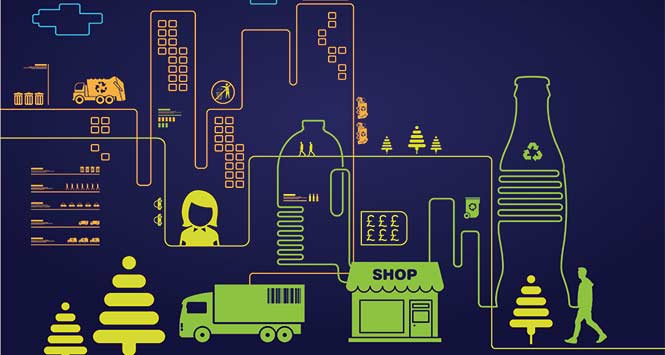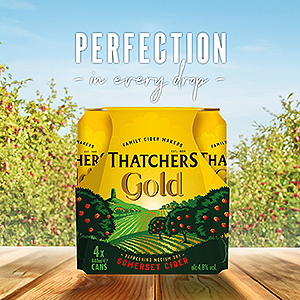Despite support from CCEP and the NFRN, the controversial deposit return scheme is still widely seen as unnecessary and impractical and would once more leave retailers picking up the pieces on an ill-conceived, if well-meaning, scheme.
by Karen Peattie
The idea for a DRS in Scotland was first mooted in 2013 by then environment secretary Richard Lochhead, who saw a deposit return scheme in action during a trip to Sweden. He believed that a scheme which offers an incentive for recycling drink containers could help tackle Scotland’s litter problem.
Leading trade organisations and companies operating across the drinks and food packaging supply chain – including the SGF and Scottish Wholesale Association – then got together to form the Packaging Recycling Group Scotland (PRGS) to oppose DRS and work with the Scottish Government to help boost recycling, reduce waste and support the Scottish anti-littering strategy.
Pressure is mounting on the Scottish Government to scrap plans to introduce a deposit return scheme (DRS) for plastic bottles and cans, with both the Scottish Grocers’ Federation and Scottish Wholesale Association firmly against its implementation because current proposals are impractical and unnecessary given the existing kerbside recycling facilities available.
However, recent support for a DRS by newsagents’ trade group the Federation of Independent Retailers (NFRN) at its Scottish conference, which followed a widely-reported U-turn on the subject by Coca-Cola UK which said it is now supporting a DRS scheme in Scotland, has angered many retailers and prompted ex-SGF president Abdul Majid to vent his frustrations on social media.
Writing on his Facebook page the Bellshill Nisa retailer said he was “angry and disappointed with fellow retailers at NFRN who flew in the face of ALL reports and ALL other retail trade bodies, ALL supermarkets and most manufacturers to support something that will not only adversely impact their members but will be the death knell for many small shops”.
The controversial NFRN development saw retailers attending the group’s conference in Dundee in March add their voices to calls for a DRS. This decision was based on a small sample of retailers attending the event. Gail Winfield, President of the NFRN in Scotland, said in a press release: “NFRN members are responsible retailers who want to play a role in protecting the environment and who recognise the damage that plastic bottles and cans can do to their surroundings.
“It’s for that reason we have agreed today to support the Scottish Government’s aim of increasing the rate of recycling but we want to ensure that any schemes to achieve this are developed in co-operation with the independent retail sector.”
Winfield admitted that while the NFRN had “concerns about the practicalities of operating such a scheme and around the potential impact of kerbside recycling” her trade group considered the issue “important enough” to justify creating a working party comprising “likeminded groups to ensure that any deposit refund scheme that is implemented in the future allows independent retailers to fully play their part”.
Coca-Cola’s U-turn on the subject hit the headlines in February when the current affairs magazine Holyrood reported that the soft drinks giant “has thrown its support behind calls for the Scottish Government to introduce a deposit return scheme, in an effort to reduce littering and boost recycling”.
Holyrood’s report, on February 22, stated: “Coca-Cola has strongly opposed the idea in the past, telling a 2015 Zero Waste Scotland consultation that ‘DRS doesn’t encourage packaging reduction or recyclability’ and that it was ‘legally questionable’ whether a DRS could be introduced in Scotland without changes to UK legislation first, with the drinks manufacturer instead arguing for local authority kerbside collections.”
An online statement by the soft drinks supplier, also on February 22, outlined its “significant progress to improve the sustainability of our packaging in recent years”. It said: “Our sustainable packaging review is ongoing, but it’s already clear from our conversations with experts that the time is right to trial new interventions such as a well-designed deposit return scheme for drinks containers, starting in Scotland where conversations are under way.”
Meanwhile, both the SGF and Scottish Wholesale Association reiterated that the Scottish Government has made no decision on DRS, pointing to a letter from Roseanna Cunningham, the current Cabinet Secretary for Environment, Climate Change and Land Reform, to the Environment, Climate Change & Land Reform Committee, which said that a DRS would “be a substantial undertaking with significant costs, essentially reforming the way that we manage materials in our communities”.
She said: “It would involve complex work to change the packaging on multiple products, install return systems, create an administrator to manage the system, introduce enforcement, redesign remaining kerbside services and so forth.
“In deciding whether this is our preferred approach in Scotland, it is important that we consider in full the potential costs and benefits, in partnership with all of those who would be involved. While it is extremely helpful to now have a rich and lively debate on deposit return, we need to ensure that we take a decision on the basis of facts and figures.”
John Lee, Head of Policy and Public Affairs at the SGF, said: “The Scottish Government, through its environment agency Zero Waste Scotland, is shortly to undertake further feasibility work and evidence gathering from key stakeholders. It is also undertaking work to look at extended producer responsibility to encourage manufacturers to become more fully involved in recycling.”
Local authority recycling rates, he continued, through kerbside collection, increased to over 44% of all waste collected in 2015. The report from Eunomia Consultants, which formed the basis of the original Zero Waste Scotland feasibility exercise published in 2015, said a DRS is likely only to raise household recycling rates by between 1.5% and 3.3%.
It has also been estimated that the reverse vending machines which form the basis of many deposit systems can cost between £20,000–£30,000.
Lee, who last month attended a meeting of the sub-committee set up by the Environment Committee to investigate the DRS issue in more depth, said: “The meeting on April 26 was extremely constructive and positive – there is a lot of understanding of the problems and costs facing retailers if a scheme is implemented. It is not a done deal.
“Our view remains that with DRS, retailers are neither the producers nor the polluters but once again are being asked to tidy up the mess. When retailers face constantly increasing cost pressures, such as implementing workplace pensions and other legislative compliance, they simply cannot afford to become mini recycling hubs with all the costs and drain on resources this would involve.”
Also last month the Scottish Wholesale Association reiterated its firm opposition to a DRS scheme, claiming that current proposals, as well as being impractical, would be costly for consumers, businesses and local councils. Executive Director Kate Salmon insisted that “enhancements to the current kerbside collections system that has served Scotland well for many years are the way forward”.
Salmon also warned of the potential for a new illicit cross-border trade in plastic bottles as well as the additional logistics and transport costs of a brand new system to return bottles to central depots rather than via current local authority provision. “A DRS isn’t an easy quick fix with no environmental impact and it’s disingenuous of anyone to suggest it is.”
Meanwhile, the Association of Convenience Stores has joined with the SGF to write to the Scottish Government highlighting concerns after conducting UK-wide research into the impact of a scheme. A survey of 2,000 consumers found that 70% preferred to use kerbside household recycling facilities over a deposit return system for bottles and cans.






